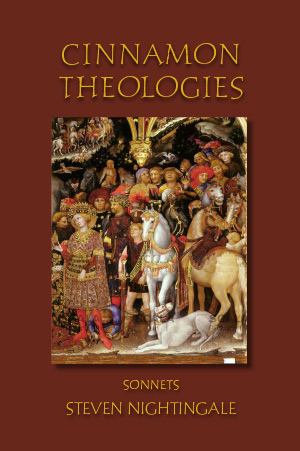
Order: |
Reviews“Steven Nightingale’s sonnets are spiritually haunted, observing ordinary life through a lens of cosmic perspective. The poems are bathed in romance and shaped by the introspective love of woman and child. Visionary and independent, the work grows out of a deep love and affinity for the sonnet form, its bones of rhyme and meter.” “Steven Nightingale is faithful to his name, being the invisible singer of sonnets disguised in form but overheard as a master should be. He addresses the world. Steven is a throwback to art with the morning air of reality.” |

IntroductionWhat is a sonnet? What might it be to you, to me; what might it mean? It is a tall window we throw open, to look upon another and a better world. It is an enchanted house. You enter, step by step and word by word, and come upon strangers who help you, cherish you. You talk with them in a room whose wood grain holds the rhythm of a song you remember at last; the fire in the hearth lights the past and the future. It is a ship we learn to sail, pulling the lines into our understanding the way sailors pull line to trim sails; so to move in concord with the clear heavens. As with the previous two books of sonnets, these poems were written in a miscellany of places; many of them in Spain, in our beloved Albayzin, a barrio in the city of Granada, where even the cobblestones hold stanzas; in Tarifa, further south, on the windblown beach, with the mountains of Morocco calling from across the Strait of Gibraltar; in the city of Fez, which is a honeycomb of beauties; in India, near a marketplace that sold big rocks of sugar, not far from a stand where families buy wood to burn their dead; in Lemon Canyon of the Sierra Nevada, sitting close by our sleeping newborn daughter; and in my beloved home state of Nevada, at campsites far out in the high desert, where the Milky Way can still crease your forehead. All through such travels, I had a battered notebook of sonnets, which I held to as a man in peril holds on to a lifeline thrown him. In the many readings I have given of such verse, I have enjoyed a persistent question, to wit: Why take so much time with such an old form? Because sonnets are a lifeline thrown to all of us by the centuries. If we are not to perish in the violence and idiocy of history, then we do well to hold fast to a form that can concentrate grace, understanding, and laughter. I think of you, reader, sitting in the light of the morning with a book of poems, reading aloud to someone you love. All the outlandish beauties of the world travel toward you, toward the two of you. The darkness of history will yield; but only to your powers and sweetness. S. N. |
|
